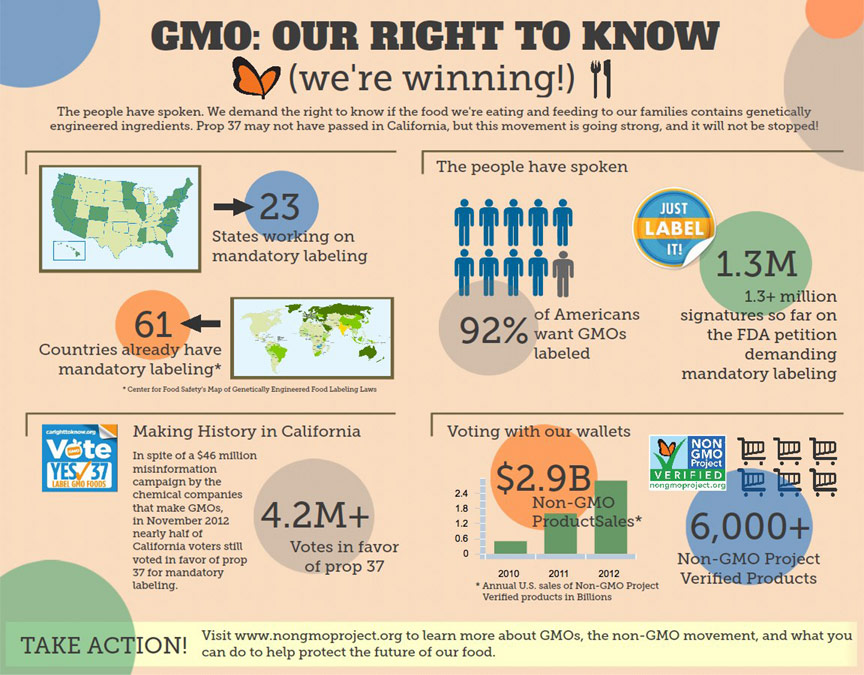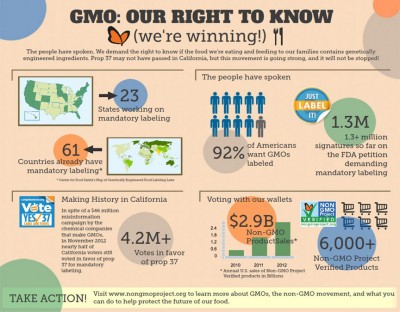With voters in the state just weeks away from deciding whether to label GMO foods, the two sides have launched their first wave of television ads.
Although the anti-GMO side is drastically outspent, the commercials are informative, well-made, and get the important point across quickly.
In November Washington voters will decide whether to pass Initiative 522 and make the state the first in the nation to require labeling products that contain GMO food. A similar initiative narrowly lost in California in 2012.
One commercial shows a woman in a grocery aisle, explaining the debate over I-522.
“We rely on labels to tell us what’s in the food we feed our families – calories, trans-fat, artificial flavors,” she says as she pulls a cereal box off the shelf. “So, here’s what 522 does: For foods sold at grocery stores already labeled, if it’s been genetically engineered, it has to say so. It’s that simple. … Big corporations are spending millions attacking labeling. Remember, they care about their profits, not our right to know.”
The No on 522 GMO labeling group has reportedly spent about $11 million — four times as much as the labeling advocates in air wars. That includes $4.5 million from Monsanto and $3.2 million from DuPont.
Robb Fraley, executive vice president and chief technology officer of Monsanto, defended the company’s spending on the initiative. Monsanto spent $8 million to help defeat the California initiative. The No on 522 campaign argues the initiative would increase food costs unfairly target some products while not labeling others.
New Survival Seed Bank™ Lets You Plant A Full Acre Crisis Garden!
“The reason people are funding campaigns for mandatory labeling is because they basically want to get rid of biotech, and they want biotech to suffer the same view as salt or sugar on the label, and the science doesn’t support it,” he told Politico.
The Yes on 522 group launched another ad showing common Washingtonians stating their support for 522. Dorie of Bellewood Acres Farm in Lynden tells the camera, “I believe people have a right to know what’s in their food.” (The ad doesn’t list last names.) Randy, a Bellingham salmon fisher, tells viewers, “We already label farm-raised fish. If salmon is genetically engineered, the label should say, so, too.”
The initiative has been endorsed by the Washington State Nurses Association, and the ad includes Joie, a naturopathic physician from Seattle, saying, “When it comes to your health, the more information, the better.” The commercial ends by showing a worker at the famous Pike Place Fish Market in Seattle saying to the camera, “It’s simple, and it won’t cost you a dime.”
A host of organic and natural food sellers and suppliers has endorsed I-522, including Whole Foods. Other prominent businesses that have endorsed include PCC Natural Markets, Marlene’s Market, Dr. Bronner’s Magic Soaps, Nature’s Path, Ben & Jerry’s and Clif Bar. The Seattle City Council has endorsed I-522, as has Seattle-based attorney Bill Marler, an expert on food safety.
So far, I-522 leads in the polls. An Elway Poll survey released in early September showed Initiative 522 leading among voters, 66-21 percent. Forty-three percent said they’d “definitely” back the proposal, while 23 percent said they’d “probably” do so. The survey interviewed 406 voters.

